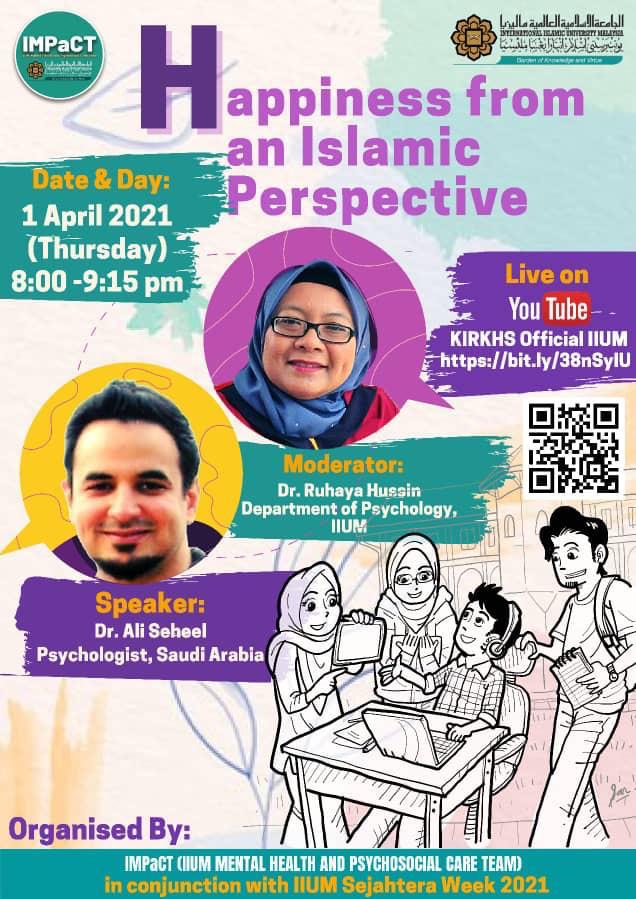By Muhammad Irfan
GOMBAK, 7 April 2021: A forum was recently told that happiness is intimately related to Allah as we seek goodness and avoid evil which leads to happiness. Since Allah is the ultimate ideal, any divine pursuit would lead to happiness, according to Dr. Ali Seheel, a psychologist from Saudi Arabia.
Dr. Ali Seheel said: œThe definition of happiness in Islam could be described as a high-order affective and cognitive well-being accompanied by a bestowed situational well-being that emerged from the pursuit as well as the attainment of faith that are guided by the Islamic revelation.
The talk delved into the question on why happiness is important where Dr. Ali Seheel explained that happiness is a central concept in philosophy, religion, and people including scientifically based benefits.
He shared that the components that constitute happiness in Islam are spiritual pursuits, spiritual experiences, religious struggles, positive emotions, and negative emotions.
His talk about happiness from Islamic perspective had shed light on its importance and relevance in todays climate.
Dr. Ali Seheel justified that understanding happiness now is important and crucial as psychology today focuses more on human deficiencies instead of what makes human life flourishing.
œAdvances in medicine in general shows that the longevity of people in many nations has increased, on the contrary mental illness has risen, Dr. Ali Seheel said.
An IIUM alumnus from the Department of Psychology, Dr. Ali Seheel did his PhD on Islam and happiness. His passion on Islam, happiness and philosophy was portrayed in the talk.
Held in conjunction with the Sejahtera Week 2021, the forum explored why happiness in Islam is relevant and different from traditional definitions of happiness. It was organised by the IIUM mental health and psychosocial care team (IMPaCT).
According to Dr. Seheel, happiness in Islam is important as the underpinnings of psychology are dominantly from western scientific literature. “Studies on happiness are mainly focused on western ideologies such as the original sin and where normative values are considered as human nature,” he said.
Dr. Ali Seheel proceeded with the problems that surround happiness with the roots of Christianity. He noted that there are several reasons for this which he identified as contradicting values, false assumptions of human nature and culturally insensitive, and bias.
The talk also looked into the problems with philosophical roots of happiness. Dr. Ali Seheel indicated that philosophical roots of happiness are a less holistic approach and less effective to the society compared to Islamic approach.
He stated that self-determinism is misleading to people as it leads to normative judgement and cognitive biases. Some cognitive biases mentioned include the illusion of control, impact bias, lay rationalism and loss aversion. Thus, it reinforced the idea that self-determinism is doubtful and human rationality is not enough for human happiness.
The talk highlighted the difference in philosophical underpinnings of psychology that has led to diverse and inconsistent definitions and measurements of happiness.
Hence, Dr. Ali Seheel provided a solution to self-determinism. He said, œThe solution is not only human rationality, we need divine guidance.” He supported the argument by stating that it is the only reliable source of true knowledge in Islam.
The online talk conducted from 8 p.m. to 9.15 p.m. through Zoom and streamed on YouTube was attended by more than 300 people.***
